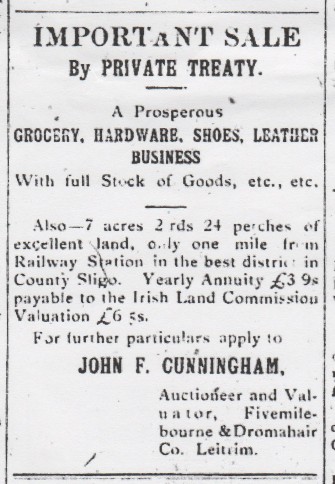Sligo local - Sligo Poets
Main menu:
- Home
-
1912
- 1912
- Sligo Poetry 1912
-
1913
- 1913
- Sligo Poetry 1913
-
1914
- 1914
- Sligo Poetry 1914
-
1915
- 1915
-
Sligo Poetry 1915
- Sligo Newspaper Poems
- Sligo Champion
- Sligo Independent
- Sligo Nationalist
-
1916
- 1916
-
Sligo Poetry 1916
- Sligo Newspaper Poems 1916
- Sligo Champion
- Sligo Nationalist
- Sligo Independent
- The Poets
- Bibliography
- The Author

Sligo Nationalist.
5 February 1916
My Own Land.
“’Twas an afternoon in Springtime! sure the world was bright and gay,
The blossoms and the flowerets fair were decked in bright array;
All the fields were white with daisies, and the birds sang merrily,
On that afternoon in Springtime–when you gave your heart to me.”
“’Twas a long sad day in Autumn–I shall mind it evermore–
When you answered to the call, dear, for and alien foreign shore;
Sure my heart was nigh to breakin’ and my tears were tricklin’ down:
On that long sad day in Autumn, there in dear old Sligo town.”
“Sure the wintertime is comin’! and I long asthore, for thee;
Just to see ye for a moment, like in times that used to be–
But across the distant ocean ye are lyin’ stiff and still;
No more in Sligo shall we meet–down the dear old windin’ hill.”
“O, sweet afternoon in Springtime! Autumn days so sere and sad?
Sure I dream on yester-
’Twas such a regal afternoon–the fields with flowers were white,
Sure songsters sweet sang songs of love–’twas then my heart was bright.”
These two poems with local references are competently written examples of two common genres of songs or poems.
"My Own Land" tells of a lover who had to emigrate and has died in a foreign land. The natural world is used as a sympathetic backdrop and instead of ending on a sad note the author is cheered by the beauties of the countryside. This poem is unattributed but is presumably by a Sligo author.
The poem's language is conventionally "poetic", full of phrases which might have appeared in nineteenth century verse such as "flowerets fair were decked in bright array" and "sere and sad". It lacks any specific local reference apart from the general reference to Sligo town and it doesn't give us any details of where the loved one lived abroad.
"Sligo for the Holidays" is a poem or song in praise of the locality, an attempt at a topographical poem. It lacks any specific local reference, battles are mentioned but none names, holy wells are mentioned but not even the well-
Both poems have good use of rhythm and rhyme and were probably intended to be sung.
John Francis Cunningham is not to be confused with J F Cunningham, the London correspondent of the Sligo Champion and then the Sligo Nationalist.
The author of this poem lived in County Leitrim just across the border with Sligo and may be this farmer's son, aged 20 in the 1911 census. He was then the only one of four children born to his mother, Rose Ellen, still alive. The family had a female servant living with them in 1901.
The John F Cunningham, auctioneer and valuer from Fivemilebourne, who advertised in the Sligo Nationalist in 1916 is presumably the same person.
Sligo Nationalist
30 December 1916
“SLIGO FOR THE HOLIDAYS”
’Mongst many and varied fond places we roam,
In this dear little country of rest,
But where can such comfort be found in a home,
Like to that which we’ve here in the West?
How nice at the Christmas, the holiday time,
Just to spend it in dear Sligo town,
Or that county famous in story and rhyme
From the oldest historians down.
The scenes of so many great battles in war
In which many fine heroes were slain,
E’en time can’t the feeling of true pity mar—
At the thoughts of those brave ones again.
The churches, the abbeys, the shrines of those men
Who had lived, and who had died for their God,
Awakens within us that spirit again,
As around those dear places we trod.
Its holy wells too, always nestled so grand
Amongst trees of the fur and the pine,
Where our saints once had prayed alone in the land
That they might with the angels combine.
So this scenic county of Sligo and town
Is in many ways ever so dear—
The saddest one’s spirit can never feel down
Amidst scenes so enchanting as here.
JOHN FRANCIS CUNNINGHAM.
Five Mile Bourne, December 1916.
